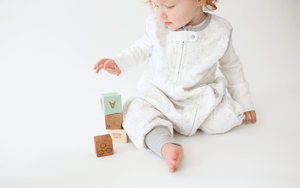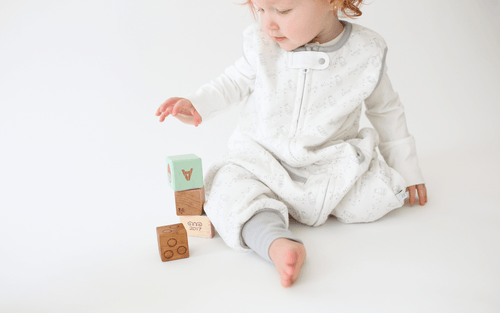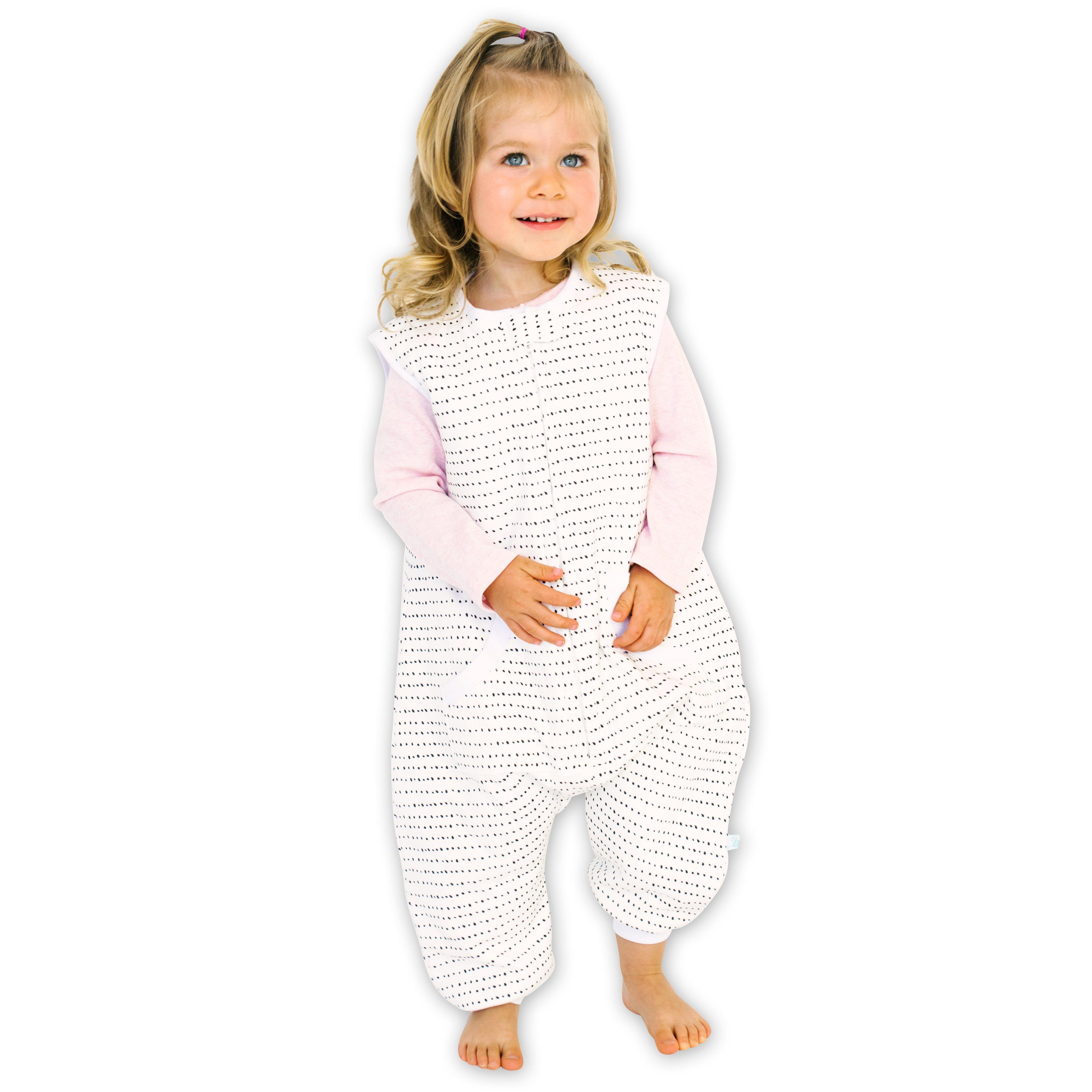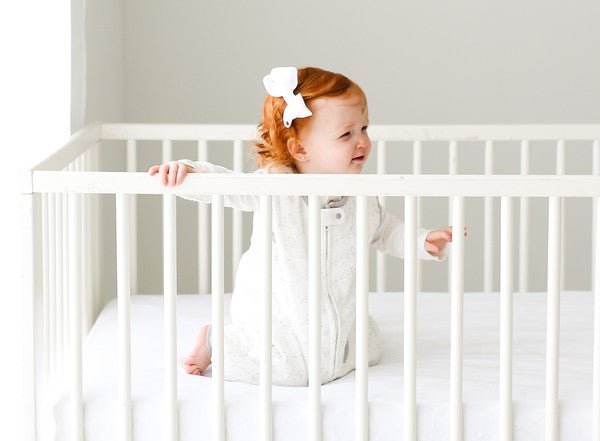How Developmental Milestones Can Affect Your Baby’s Sleep

Watching your baby reach big milestones and acquire new skills is one of the most exciting things about being a parent. It seems like just a few weeks ago you brought your newborn home from the hospital. Now he’s babbling, laughing and climbing on everything!
While each child is different, most babies will be able to pull to stand and crawl between 6-12 months. By 12 months, many babies have taken a few (wobbly) independent steps. And at 18 months most are toddling around on their own.
Developmental milestones are a sign that your baby is growing and developing as they should, which is great! What’s not so great are the disruptions to sleep that often accompany big milestones.
This guide gives you tips on how to handle disruptions to your baby’s sleep caused by milestones.
Why your baby wakes at night when learning a new skill

Standing, crawling and walking are three developmental milestones categorized as “gross motor milestones.” That’s because they’re associated with your baby’s body control and motor skills.
Interestingly, research has shown that babies who are exploring these kinds of milestones often sleep deeper, but have more fragmented sleep than babies who have not reached the same milestones. That’s because it consumes a lot of energy for your baby to practice these big physical skills. But it’s hard for your little one to sleep several consecutive hours (let alone the whole night) because his brain is still trying to understand this new skill. And, of course, he wants to practice it all night long!
It’s common to see increased night wakings in babies who are working on new milestones. Parents often tell me that their little one is wide awake in the crib in the middle of the night, sitting or standing up.
What’s unique about milestones interrupting sleep is that babies typically wake up happy and energetic at night. They want to practice their new skill! While a waking related to teething, illness or a sleep schedule issue usually involves a cranky or crying baby.
Of course, after a while your baby may start crying if she is unable to lay back down on her own or is wanting your comfort or reassurance.
So now you know why your baby is suddenly waking at night, which can be helpful. But I’m sure the bigger question is what you can do to help your little one start sleeping all night.
Here are my top 3 tips to stop developmental milestones from worsening your baby’s sleep.
1. If your baby wakes at night and is happy or quiet in the crib, leave him!

When it comes to developmental milestones interrupting sleep, independence is key. When going through a big milestone, it’s normal for your baby to wake up and see an opportunity to practice their new skill, which usually involves standing or sitting up. This seems harmless enough. The trouble is that many little ones get “stuck” trying to lay back down.
If your baby is happy and awake, hanging out in the crib, give him space to practice. Even though it may feel like he’s struggling, your baby may actually be happily exploring his new abilities! It’s good for babies to be given the opportunity to learn how to handle night wakings on their own, instead of becoming dependent on parents to “rescue” them.
Given the space and opportunity, most babies will be able to lie back down on their own in a matter of days.
Most parents worry about their baby losing sleep, and that’s understandable. So, after 20 minutes, it’s okay to go to your baby and gently help him lie down. I recommend that you sit down on the floor next to the crib and pat the mattress, to encourage your baby to lie down. Remember, we’re working on independence! Sitting on the floor encourages your baby to come down to your level. Standing next to the crib makes your baby want to stay up!
2. If your baby wakes at night and is upset, wait 5 minutes then lay her back down once.

It’s so hard to see your little one struggling in the night. And at 3 am I know that we parents will do anything to get back to sleep. Just remind yourself that a small opportunity for your little one to resettle themself can help everyone get back to sleeping through the night more quickly.
If your baby is upset, wait just 3-5 minutes to see if she can lie down on her own. Just a few minutes! At that point, if your little one is still upset, go and sit down on the floor next to the crib and pat the mattress, to encourage her to lie down.
If this doesn’t work, go ahead and gently lay your baby down. Rest your hands on her chest lightly for a minute or two, helping her resist the urge to pop right back up. It’s best if you lay your baby down only once, otherwise she may think it’s a game and want to play jack-in-the-box all night!
If you know that your baby is able to get down independently, you can wait even longer before you go in, even if she’s a little upset. Remember, the quicker she understands that she needs to get herself back down, the quicker these night wakings will stop!
3. Let your baby practice new skills during the day

While most of the work for hitting milestones falls onto your little one, there are things parents can do to speed up the process.
For example, give your baby lots of floor time during the day. Let your little one practice standing, crawling or walking as much as possible during the day in order for him to “get it out of his system” before bedtime. The more time your baby spends trying to understand and practice new skills during the day, the less exploration is left for night time!
If possible, spend time outdoors to help your baby explore his new milestone in various settings. This is also a great way to burn off energy, take in fresh air and be exposed to sunlight, which also helps babies sleep better.
Developmental milestones are a sign that your baby is healthy, developing, and gaining control of their physical abilities. Nonetheless, it can steal a lot of much-needed sleep from both baby and parents. The key to resolving this issue is to allow your baby the space, both night and day, to practice and figure out new skills independently. The more space is offered to practice (safely), the quicker your baby’s night wakings will pass.
I hope these tips help you get through this phase quickly, so you and your baby can get back to sleeping all night!
If you have any questions about baby sleep you can find me on Facebook or Instagram.






















